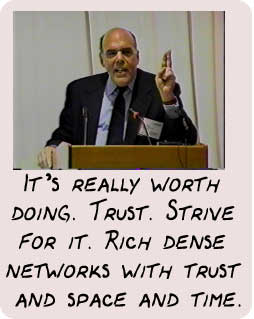|
|
Katalina Groh, Larry Prusak: Some of the world's leading thinkers |
| Storytelling: Organizational Perspective: Larry Prusak |
 |
Strength
and durability of social networks
Another big social capital issue
is the strength and durability of networks and ties. And this is of course
eroded by volatility and telecommuting and virtuality. People trust each
other when they know each other. Trust is a big function of reciprocal
relationships over time. Although you can trust a person on meeting them,
the kind of quick trust, the army stuff, that exists, and a lot of people
who deal with emergency situations, but generally, you trust a person over
time. There are some repeated transactions, and they act in a way that
is trustworthy. They do what they say they are going to do. They donít
do what they say that they are not going to do.
|
| There is no trust because
there are no durable networks, except at the very top. Thatís true in a
lot of organizations, organizations that like stirring the pot, that like
constant turnover. You donít get durability in networks and you lose social
capital.
Social capital is strongly dependent on rich durable networks which develop trust, which develop knowledge sharing, develop a sense of reciprocity so that it becomes generalized. Generalized reciprocity. What I mean by that is someone who asked you a question that is going to cost you something in time and effort, but youíre going to answer it, not because you owe that specific person a favor, but because the culture is one of generalized reciprocity. It gets embedded in the norms. That again is worth its weight in platinum. Look at firms that are low generalized reciprocity, versus high. You really see a difference. You can feel it when you walk around the place. And these are things that you can act on, you can work with, by trying to keep these networks in place. Now again, thereís a dark side to this. You donít want cliques. You donít want groups that exclude others. Weíve seen plenty of that in America. Someone said when I wrote this book on social capital, well, the Klu Klux Klan has very high social capital. You surely donít approve of that? Well, thereís some truth to that. You can get cliquishness, you can get an exclusion, you can get all sorts of paranoid fantasies, in groups that donít have input from the outside. Thereís a dark side to anything. On the other hand, itís really worth doing. Itís really worth doing. Trust. Strive for it. Rich dense networks with trust and space and time. And a sense of identity. I mean it isnít quite as true for you people, though it sure is true in the outside world. You retain people. I have to give this big talk to the consulting firms in December and they think, because they come from business schools, they think itís all about money. Not true, folks. Thereís a ton of research showing that Maslow was right. Past a certain point, itís not money. People get really pissed off when they see inequalities, and when theyíre not treated well. But past a certain point, people donít work for money. The point is not that high. They donít work necessarily for money. What do they work for? Recognition. Identity. Feelings about your coworkers really count. And thatís whatís ignored in the workplace so often, including in my own firm, in any large firm. We have forty firms as members of the Institute for Knowledge Management, and all of them are facing these issues. But some really address it. The SAS Institute. UPS. I could name some that are really careful about this. This really matters to us. So weíre not going to move people around too much. Weíre not going to go overboard on virtuality, which can be crazy idea. People sometimes say that IBM stands for, ďIím By Myself.Ē And of course, big companies have to eat their own cooking: they give people a laptop and think thatís the answer to their problems. There are a lot of firms that act like this. It goes against everything weíve learnt in social science for the last three hundred years, that people need a sense of identity, a sense of ďgroupnessĒ, a sense of working with other people. Weíre made that way. Weíre hard-wired that way. |
| Books and videos on storytelling *** In Good Company : How Social Capital Makes Organizations Work by Don Cohen, Laurence Prusak (February 2001) Harvard Business School Press *** The Social Life of Information, by John Seely Brown, Paul Duguid (February 2000) Harvard Business School Press *** The Springboard : How Storytelling Ignites Action in Knowledge-Era Organizations by Stephen Denning (October 2000) Butterworth-Heinemann *** The Art of Possibility, a video with Ben and Ros Zander : Groh Publications (February 2001) |
| The views expressed on this website are those of the authors, and not necessarily those of any person or organization |
| Site optimized in 800x600: webmaster CR WEB CONSULTING |
|
|
|
|